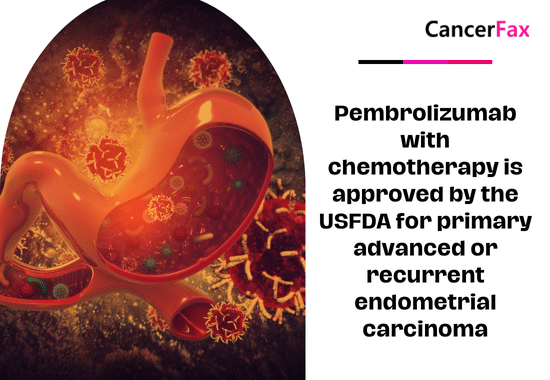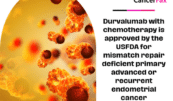Pembrolizumab with chemotherapy is approved by the USFDA for primary advanced or recurrent endometrial carcinoma
June 2024: Pembrolizumab (Keytruda, Merck) has been authorized by the Food and Drug Administration for the treatment of adult patients with primary, advanced, or recurrent endometrial cancer. The treatment involves the use of pembrolizumab in combination with carboplatin and paclitaxel, followed by the use of pembrolizumab alone.
The effectiveness of the treatment was assessed in a clinical experiment called KEYNOTE-868/NRG-GY018 (NCT03914612). This trial had 810 patients with advanced or recurrent endometrial cancer and followed a multicenter, randomized, double-blind, placebo-controlled design. The experiment consisted of two distinct groups categorized by their mismatch repair (MMR) status: 222 patients in the mismatch repair deficient (dMMR) group, and 588 patients in the mismatch repair (pMMR) competent group. Participants were assigned randomly, in a 1:1 ratio, to one of the treatment groups listed below:
The treatment plan consists of administering pembrolizumab at a dose of 200 mg every 3 weeks, paclitaxel at a dose of 175 mg/m2, and carboplatin at a dose of AUC 5 mg/mL/min for a total of 6 cycles. This will be followed by pembrolizumab at a dose of 400 mg every 6 weeks for a maximum of 14 cycles.
The treatment regimen consists of a placebo administered every 3 weeks, paclitaxel at a dosage of 175 mg/m2, and carboplatin at a dosage of AUC 5 mg/mL/min for a total of 6 cycles. This is then followed by a placebo administered every 6 weeks for a maximum of 14 cycles. The randomization process was divided into strata based on MMR status, ECOG performance status (0 or 1 vs. 2), and prior adjuvant treatment.
The primary measure of effectiveness was progression-free survival (PFS), which was evaluated by the investigator using RECIST 1.1 criteria. In the cohort of patients with deficient mismatch repair (dMMR), the median progression-free survival (PFS) was not reached (NR) (95% confidence interval [CI]: 30.7, NR) in the group receiving pembrolizumab plus chemotherapy, whereas it was 6.5 months (95% CI: 6.4, 8.7) in the group receiving placebo and chemotherapy.
The hazard ratio (HR) for PFS was 0.30 (95% CI: 0.19, 0.48), indicating a significant difference between the two groups. The p-value was less than 0.0001. In the pMMR cohort, the median progression-free survival (PFS) was 11.1 months (95% confidence interval [CI]: 8.7, 13.5) for patients receiving pembrolizumab and chemotherapy, and 8.5 months (95% CI: 7.2, 8.8) for those receiving placebo and chemotherapy. The hazard ratio (HR) for PFS was 0.60 (95% CI: 0.46, 0.78; p-value <0.0001).
The adverse reactions observed with pembrolizumab and chemotherapy were mostly consistent with the known side effects of pembrolizumab or chemotherapy, except for a greater occurrence of rash. Refer to the prescription information for a comprehensive list of adverse effects.
The suggested dosage for pembrolizumab is 200 mg administered every 3 weeks or 400 mg every 6 weeks, unless there is evidence of disease progression, intolerable side effects, or for a maximum duration of 24 months.
Susan Hau is a distinguished researcher in the field of cancer cell therapy, with a particular focus on T cell-based approaches and cancer vaccines. Her work spans several innovative treatment modalities, including CAR T-cell therapy, TIL (Tumor-Infiltrating Lymphocyte) therapy, and NK (Natural Killer) cell therapy.
Hau's expertise lies in cancer cell biology, where she has made significant contributions to understanding the complex interactions between immune cells and tumors.
Her research aims to enhance the efficacy of immunotherapies by manipulating the tumor microenvironment and exploring novel ways to activate and direct immune responses against cancer cells.
Throughout her career, Hau has collaborated with leading professors and researchers in the field of cancer treatment, both in the United States and China.
These international experiences have broadened her perspective and contributed to her innovative approach to cancer therapy development.
Hau's work is particularly focused on addressing the challenges of treating advanced and metastatic cancers. She has been involved in clinical trials evaluating the safety and efficacy of various immunotherapy approaches, including the promising Gamma Delta T cell therapy.
- Comments Closed
- June 22nd, 2024






Advanced endometrial carcinoma treatment, FDA-approved immunotherapy 2023, Keytruda chemotherapy combination, MSI-H/dMMR cancer treatment, PD-1 inhibitor for uterine cancer, Pembrolizumab endometrial cancer, Precision medicine for gynecologic cancers, Recurrent endometrial cancer therapy
CancerFax is the most trusted online platform dedicated to connecting individuals facing advanced-stage cancer with groundbreaking cell therapies.
Send your medical reports and get a free analysis.
🌟 Join us in the fight against cancer! 🌟
Привет,
CancerFax — это самая надежная онлайн-платформа, призванная предоставить людям, столкнувшимся с раком на поздних стадиях, доступ к революционным клеточным методам лечения.
Отправьте свои медицинские заключения и получите бесплатный анализ.
🌟 Присоединяйтесь к нам в борьбе с раком! 🌟